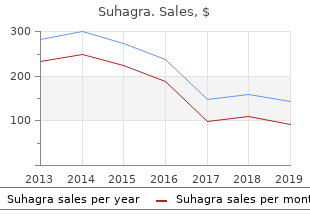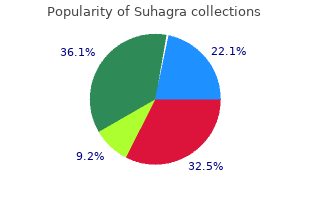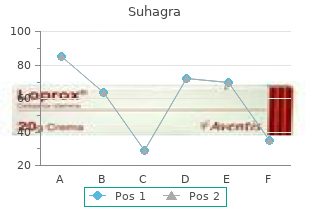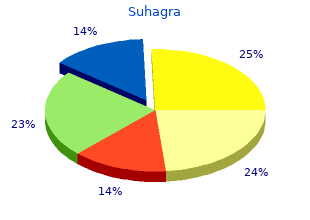Suhagra
"Purchase generic suhagra online, erectile dysfunction 34 year old male."
By: Karen Patton Alexander, MD
- Professor of Medicine
- Member in the Duke Clinical Research Institute

https://medicine.duke.edu/faculty/karen-patton-alexander-md
Then generic 100 mg suhagra mastercard zolpidem impotence, unless I go to effective 100 mg suhagra erectile dysfunction treatment hong kong the store to buy suhagra 100mg low cost erectile dysfunction treatment sydney pick up more stuff, I’ll go home and lie to my wife. I become increasingly cynical about the world—politics, people, possibility, the future. Every morning I get into a hostile argument with the newspaper, resenting it for what it says or doesn’t say. The Globe and Mail, in its news slant, editorials and choice of columnists, favours corporations, the mainstream parties and neo-con foreign policy makers. It’s still the best paper in Canada, and I’m the one who chooses to fund it with my subscription dollars. Would that the spread of negativity were confined to my prickly relationship with print journalism. No, I become increasingly and reflexively critical, irritable and self-righteous with my teenaged daughter. I can’t be optimistic and believe in her growth and development when I know I’m sabotaging my own. At age seventeen, she’s at no loss for words or body language to communicate her displeasure. Because my internal world is dominated by obsession, I have little to say and what I do say rings hollow in my own ears. Because my attention is pulled inward, the interest I offer her becomes dutiful, rather than genuine. When I’m in one of my addictive cycles, it’s almost as if I were engaged in a sexual affair, with all the attendant obsession, lying and manipulation. It’s impossible to be fully present when you’re putting up walls to keep from being seen. Something’s got to give, and it does–sometimes for days, sometimes for weeks and months. When they were much younger, I’d keep my children waiting or hurry them along to suit my purposes. If I could, I’d expunge from my personal history the time I left my eleven-year-old son at a comic-book shop after a soccer game, with one of his teammates. I’d not only run to the store across the street; I’d also driven to another one, downtown, on my quest for whatever was at that moment my must have-immediately recording. My son’s face was clouded with anxiety and bewilderment when he finally saw me at the comic-book shop door. I’d rush into the house, stashing my latest purchases on the porch, pretending to be home and grounded. When the reckoning came, as it always did, I made guilty confessions and soon-to-be-broken promises. I hated myself, and this self-loathing manifested itself in the harsh, controlling and critical ways I’d deal with my sons and my daughter. When we’re preoccupied with serving our own false needs, we can’t endure seeing the genuine needs of other people—least of all those of our children. Perhaps the nadir, but certainly not the end, of my addictive years came when I left a woman in labour to run over the bridge, in midday traffic, to Sikora’s. Even then, I would have had time to return to the hospital for the delivery had I not begun to cast about for other recordings to buy. I enjoyed a reputation in Vancouver as a physician who extended himself for his pregnant patients and would support them compassionately through their delivery. And the truth is that as of this writing, neither my public acknowledgments of my behaviour nor my thorough understanding of its impact on myself and my family has stopped me from repeating the cycle. I’ve authored three books and receive letters and emails from readers the world over, thanking me for having helped them transform their lives. Yet I have continued to choose patterns that darken my spirit, alienate those closest to me and drain my vitality. I haven’t seen him for a long time, but he did call regularly, proudly reporting on his progress and his determination to stay clean. He’s been living in the streets for weeks but plans to admit himself to a Christian rehabilitation camp. Sean eagerly downs his first dose before recounting the details of this most recent relapse. Annoyed by his neediness and weakness of will—that is, by my own—I want to teach him a lesson.
High Tohen buy suhagra american express erectile dysfunction doctors new york, 2008b28 See forest plot E40 See forest plot E42 See forest plot E43 See forest plot E44 suhagra 100 mg for sale erectile dysfunction forum discussion, See forest plots E47 cheap suhagra 100mg without prescription erectile dysfunction question, above for response. Suicidal Ideation Olanzapine: 1 case Placebo: 0 cases Tohen, 200029 See forest plot E40 See forest plot E42 See forest plot E43 See forest plot E44, See forest plots E47, 10986547 above for response. Publication bias for antipsychotics, antidepressants, and behavioral interventions for depressive disorders is suspected. Industry 22054797 Vieta, 201018 High Blinding not described; large dropout in placebo group (41%). Industry 20565430 Li, 200838 Moderate Randomization and blinding procedure not described. Industry 18028587 Bowden, 200539 High Randomization and blinding procedure not described; >50% dropout in placebo group at day Industry 84; 33% at 3 weeks 15669897 McIntyre, 200514 Moderate Dropout rate for quetiapine and placebo in 30%-40% range, lacks some core information on Industry how allocation was concealed and blinding of treatment staff and raters was maintained. Strength of evidence assessment: quetiapine versus active comparator for acute mania # Studies/ Finding or Overall Study Comparison Outcome Design Summary Consistency Directness Precision Grade/ Limitations (n analyzed) Statistic Conclusion Response Remission Quetiapine vs. We calculated fixed-effect models to provide a charitable estimate of the average effect among completed trials. Industry 22592508 Vieta 200845 Moderate Randomization and blinding procedures not disclosed. Government 26060401 Houston, 200948 High Randomization and blinding procedures not described. Industry 18245032 Tohen, 2002a50 High Randomization and blinding procedures not described. Strength of evidence assessment: olanzapine plus mood stabilizers versus placebo for acute mania # Studies/ Finding or Overall Study Comparison Outcome Design Summary Consistency Directness Precision Grade/ Limitations (n analyzed) Statistic Conclusion 6 weeks Olanzapine Remission vs. Strength of evidence assessment: olanzapine plus mood stabilizers versus active comparison for acute mania # Studies/ Finding or Overall Study Comparison Outcome Design Summary Consistency Directness Precision Grade/ Limitations (n analyzed) Statistic Conclusion Response Olanzapine Remission adjunctive vs. Did not address how 680 were randomized but only Industry 656 treated and analyzed. Aripiprazole for the maintenance placebo-controlled, double-blind study of the treatment of bipolar I disorder: A review. Effects with bipolar I disorder: a double-blind, placebo of lamotrigine and lithium on body weight during controlled study. Asenapine Aripiprazole in the treatment of acute manic or in the treatment of acute mania in bipolar I mixed episodes in patients with bipolar I disorder: disorder: a randomized, double-blind, placebo a 3-week placebo-controlled study. Olanzapine Acute and continuation risperidone monotherapy versus lithium in the acute treatment of bipolar in bipolar mania: a 3-week placebo-controlled mania: a double-blind, randomized, controlled trial followed by a 9-week double-blind trial of trial. Divalproex sodium versus olanzapine in the mania: a double-blind, placebo-controlled treatment of acute mania in bipolar disorder: comparison of efficacy and safety. A 12-week, double-blind comparison paliperidone extended release for the treatment of of olanzapine vs haloperidol in the treatment of acute manic and mixed episodes of bipolar I acute mania. Olanzapine-valproate mania: clinical outcomes, health-related quality of combination versus olanzapine or valproate life and work status. International Clinical monotherapy in the treatment of bipolar imania: Psychopharmacology. Efficacy Japanese patients with bipolar I disorder in a of olanzapine in acute bipolar mania: a double current manic or mixed episode: a randomized, blind, placebo-controlled study. Long-term to lithium in mania: a double-blind randomized efficacy of quetiapine in combination with controlled trial. International Clinical lithium or divalproex on mixed symptoms in Psychopharmacology. Response and efficacy of olanzapine monotherapy and remission rates in Chinese patients with bipolar olanzapine with a mood stabilizer in 18-week mania treated for 4 weeks with either quetiapine treatment of manic/mixed episodes for Japanese or lithium: a randomized and double-blind study. Ziprasidone in acute bipolar mania: a 21-day Olanzapine versus risperidone in the treatment of randomized, double-blind, placebo-controlled manic or mixed States in bipolar I disorder: a replication trial. A Ziprasidone in the treatment of acute bipolar comparison of the efficacy, safety, and tolerability mania: a three-week, placebo-controlled, double of divalproex sodium and olanzapine in the blind, randomized trial. Quality of as adjunctive treatment for acute mania associated life assessment in patients with bipolar disorder with bipolar disorder: results of a 12-week core treated with olanzapine added to lithium or study and 40-week extension.


Tere is no doubt that in contemporary confict purchase suhagra with visa erectile dysfunction pills online, an ofensive campaign stands a far greater chance of success if air power is available to discount suhagra 100 mg mastercard loss of erectile dysfunction causes be used optimally buy cheap suhagra 100 mg online erectile dysfunction over 75. Sun Tzu’s axioms can be interpreted at two levels of the application of air power, one that remains at the strategic level and the other that dips down into the operational level of the conduct 420 Decisive Trusts of an ofensive campaign. At the strategic level, air power can be used as an efective deterrent capability, especially if being employed within the larger whole-of-nation security strategy. Further, air power has the inherent capability to control the tempo and direction of a confict, provided its employment is controlled at the strategic level by commanders who are professional masters. At the operational level, air power is critical to swift victory, one of the more important axioms that Sun Tzu advocates a number of times in the treatise. The benign capabilities of air power, such as airlift and surveillance, will be able to shape the battlespace efectively, but to achieve unequivocal victory it is necessary to apply lethal force, with discrimination, proportionality and accuracy. Air power is ideally suited to achieving this, with the added capability to attack prioritised centres of gravity of the adversary in parallel. Ofensive air campaigns are best controlled at the strategic level of command and executed at the appropriate lower level. Sun Tzu’s advice in this chapter translates to one of the fundamental tenets of the employment of air power that has stood the test of time—centralised control and decentralised execution. In this chapter Sun Tzu has the most humanitarian approach to warfare as compared to all the other chapters in the entire treatise, in that he describes how intelligence can be used to avoid costly military mistakes that would otherwise result in great human sufering. Sun Tzu demonstrated the importance of intelligence to victory in battle by emphasising that the greatest rewards and the most generous support should be given to the elements involved in intelligence gathering. He also stated that brilliant leaders will be able to coordinate and use intelligence sources in such a way as to provide them with clear and unbroken information The Art of Air Power regarding the prevailing situation at all times, both in war and peace. A well-planned and skilfully executed intelligence gathering and dissemination strategy is vital to the success of a military campaign. It is essential to know the factors that drive the adversary strategy and the direction they are likely to take in a confict in order to formulate one’s own strategies. Information regarding the adversary, their past experiences and future aspirations, must be located, collected and placed in context, so that their manoeuvres—military and others—can be analysed and understood in their entirety. This is the optimum way to develop one’s own strategy for victory in a confrontation with a particular adversary. Sun Tzu recognised the importance of intelligence, especially advance information that he called foreknowledge, in avoiding being surprised in confict, which is the real enemy in confrontations. At the same time, by keeping one’s own strategy carefully concealed, away from the adversary’s intelligence network, one can create an element of surprise for the adversary. In this chapter Sun Tzu ofers a pragmatic opinion regarding the need for accurate information while denigrating the use of superstitious or mystical methods of prediction as opposed to basing it on realistic, reliable data. Considering the period when the treatise was written, this is a remarkably modern attitude. Since human intelligence was the primary means of gathering information in ancient times, the chapter actually highlights its importance in the context of campaigns of the time. Although some analysts subscribe to the viewpoint that this chapter was added at a later stage after the main treatise was completed, there is no evidence to support it or to indicate that Sun Tzu himself did not write the chapter. The style and the breakdown of the contents of the chapter are the same as the other chapters and it is felt that this chapter forms an integral part of Sun Tzu’s Art of War. In the translation of the stanzas of the chapter, reproduced below, the term ‘intelligence’ has been used instead of the word ‘spy’ that some other translations and interpretations use, in order to bring them to a contemporary context. This is more so since in the contemporary environment the majority of intelligence is gathered by means other than physical human collection. Currently there is a pervasive feeling that this move away from human intelligence or ‘humint’ has led to the lowering of the assurance level regarding the accuracy of information that is gathered. However, in contemporary security situations, a balanced combination of technological methods and humint may be the optimum way forward to ensuring information superiority. During the interwar period from 1919 to 1939, France formulated a weak and vulnerable strategy of forward defense, driven by her obsession with the methodical battle technique perfected at the end of World War I. On 10 May 1940, the world watched with horror as Germany, with far fewer resources, successfully invaded the Low Countries and Northern France. Germany had made the right strategic choices; her blitzkrieg concept of warfghting took full advantage of the mechanization of warfare. While France was mired in an older strategy, Germany was energized by emerging technology to develop a bold ofensive strategy.


I don’t have any medical proof that you have diabetes buy suhagra no prescription new erectile dysfunction drugs 2011, dysphagia or any salt-or gluten-related problem purchase 100 mg suhagra fast delivery erectile dysfunction johannesburg. I can’t make out the beginnings of his next phrase purchase suhagra 100 mg free shipping impotence natural home remedies, which ends with “Rich American tourists laugh at us…American Jews…” “American what? I’m drawn in, however, by my determination to preserve my professional sangfroid and the therapeutic contact with the patient. His sallow cheeks quiver with anger, his voice rises and the velocity of his speech accelerates with every word. That Jew Stalin slaughtered 90 million Germans…the invasion of our fuckin’ country…being fuckin’ paralyzed, starved to death. The suffering Germans and rapacious Jews in his narrative are projections of his own phantoms. The erratic mishmash he calls history reflects his inner chaos, confusion and fear. There are many more to follow, several ending with Ralph hoisting the Nazi salute. Generally I rise when the rant begins and open the door to signal the end of the visit. Ralph usually takes the hint, but on one occasion I threaten to call the cops if he doesn’t expeditiously remove himself from my office. He declaims staccato paragraphs of fluent German or lines from the Iliad in what sounds plausibly like ancient Greek. The second time we meet, he erupts in a storm of German recitation; the only word I recognize is “Zarathustra. It’s impossible to know how much truth there is in his idiosyncratic anecdotes, but his knowledge of culture is impressive—all the more so, since it seems largely self-acquired. I jimmied the lock, took this girl up and I played his piano and had a great time. Ralph, a shade cocaine-manic, segues right into an entirely unexpected performance. Maybe it was auctioned off, maybe the security guard got it, maybe it went into the garbage. Never fluent in the language, I’m unable to understand any of it, but I make a happy guess. He presents this poem without his customary hasty intensity; his voice is soft and gentle. There it is: Goethe’s paean to spiritual enlightenment, the blessed union of the human spirit with the feminine principle, with divine love. Goethe, like Dante in the Divine Comedy, represents divine love as a feminine quality. I find Ralph’s translation of Goethe, whether it’s his own or memorized, more moving than the version I have in my hands. As I read the great German’s poet’s verses in my comfortable home in an upscale, leafy Vancouver neighbourhood, I can’t help thinking that at this very same moment Ralph, supported by his cane, is holding vigil somewhere in the dusky and dirty Hastings Street evening, hustling for his next hit of cocaine. If I understand him well, above everything Ralph aches for unity with the eternal feminine caritas— blessed, soul-saving divine love. Divine here refers not to a supernatural deity above us but to the immortal essence of existence that lives in us, through us, beyond us. Religions may identify it with a god belief, but a search for the eternal extends far beyond formal religious concepts. At conferences devoted to science-based addiction medicine, it is more and more common to hear presentations on the spiritual aspect of addictions and their treatment. The object, form and severity of addictions are shaped by many influences—social, political and economic status, personal and family history, physiological and genetic predispositions—but at the core of all addictions there lies a spiritual void. In the case of Serena, the Native woman from Kelowna, that void was generated by the unbearable abuse she suffered as a child—a theme I’ll return to later. But for now, suffice it to say that if I hadn’t already sensed Ralph’s secret God-thirst from his Goethe recital, Ralph would, a few months hence, confirm it in so many words. In his soul of souls he longs to connect with the very same feminine quality within himself that his bellicosity and unbridled aggression trample so viciously underfoot. Soon afterwards, perhaps at the very next visit, we are back to the Arbeit macht freis, the schmutzige Judes, the Heil Hitlers. Blood-borne bacterial infections are frequent complications of drug use, especially given the poor hygienic state of many Downtown Eastside addicts.
Purchase suhagra 100mg fast delivery. Best Tips For Treating Impotence | Erectile Dysfunction Health And Natural Tips.
References:
- https://www.centerforhealthsecurity.org/our-work/pubs_archive/pubs-pdfs/2020/200417-reopening-guidance-governors.pdf
- http://aircconline.com/csit/csit885.pdf
- https://www.airuniversity.af.edu/Portals/10/ASPJ/journals/Volume-25_Issue-1-4/2011_Vol25_No1.pdf


